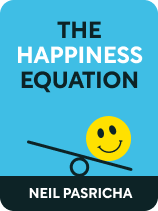

This article is an excerpt from the Shortform book guide to "The Happiness Equation" by Neil Pasricha. Shortform has the world's best summaries and analyses of books you should be reading.
Like this article? Sign up for a free trial here .
Can true happiness be found externally? Why do they say that “happiness comes from within”?
Basing happiness on circumstances prevents you from feeling happy. Life’s full of problems and challenges—circumstances are rarely exactly how you want them to be, no matter how hard you try to force them into place. Therefore, there’s always an excuse not to be happy. But unwanted experiences aren’t to blame for your misery—looking for happiness outside of yourself is.
Here’s why relying on external circumstances won’t make you happy.
Relying on External Circumstances to Make You Happy
Looking for happiness externally prevents you from finding it. Though unwanted circumstances appear to justify your unhappiness, happiness isn’t linked to circumstances themselves—rather, it’s linked to how you think about them.
(Shortform note: In The Power of Positive Thinking, Norman Vincent Peale takes this idea one step further—he claims that unwanted circumstances aren’t only a cause of negative thoughts, but are also a result of negative thoughts. He explains that your thoughts about a circumstance determine how you react to it. This reaction—positive or negative—shapes how subsequent circumstances play out. For example, consider how your thoughts during an argument shape what happens next. When you think negatively, you feel wronged and react defensively or aggressively, exacerbating the conflict. On the other hand, thinking positively leads to more rational reactions that help to resolve the conflict.)
This suggests a simple solution: Think about your circumstances positively. However, though you may know you’ll feel better about unwanted experiences if you think positively, you’re more likely to think negative thoughts and make yourself feel worse. According to Pasricha, this inclination to think negatively is due to evolution: To ensure survival, your ancestors had to constantly stay alert to danger and think about food and shelter. Letting their guard down and enjoying themselves made them vulnerable to predators and competitors.
Hundreds of years on, you’re living a lot more comfortably, but your instinct to avoid danger hasn’t evolved. However, instead of protecting you from threats to your survival, this instinct now encourages you to focus on “threats” such as what you don’t have and what needs to improve. This negative focus convinces you that you have endless reasons to feel unhappy.
The Negativity Bias Influences Perceptions, Emotions, and Long-Term Memory
Research backs up Pasricha’s claim that we’re hard-wired to think negatively and offers additional insights into how this instinct affects our perceptions, emotions, and long-term memory.
Psychologists refer to the tendency to notice and dwell on negative experiences as the Negativity Bias. They explain that this bias causes negative experiences to have a greater emotional impact on you than positive ones. Subsequently, negative events create a strong and vivid impression in your long-term memory—you’re more likely to notice, react to, and remember:
– Criticism more than praise
– Sad memories more than happy memoriesBad news more than good news- Your mistakes more than your successes
– Negative traits in others more than their positive traits
As Pasricha argues, this negative focus prevents you from noticing things that are going well and provides “evidence” that you have reasons to feel unhappy. Even though this tendency is a result of evolution, psychologists agree that you can make the conscious decision to bypass it, evolve your thinking, and adopt a more positive approach to life, thus overcoming your reliance on circumstances being a specific way to feel happy.

———End of Preview———
Like what you just read? Read the rest of the world's best book summary and analysis of Neil Pasricha's "The Happiness Equation" at Shortform .
Here's what you'll find in our full The Happiness Equation summary :
- How to overcome the four common obstacles to happiness
- The five methods to reduce the toll of trivial tasks and decisions
- Why you need to stop chasing external validation






